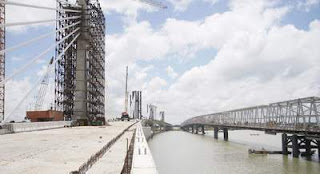
Prisoners of ropes
Dozens of kids engaged in worst form of child labour at rope factories in city outskirts; rigours apart, they routinely suffer from lung ailments
At school going age these children are exhausting themselves working in a rope factory beneath the Second Buriganga Bridge at Keraniganj. Photo: Shafiqul AlamEmran Hossain
Big sacks containing coils of rope pile up on the floors of four rope factories under the Buriganga Bridge in Aganagar in Keraniganj as 40 children toil away all day long every day.
Since daybreak the children aged between five and twelve work hard for at least 12 hours, featuring one of the worst forms of child labour with exposure to various health hazards.
These children constantly run between two pillars, carrying strings from a spinning wheel to the other end covering a distance of 33 feet for rope production. There are four such wheels each in all the four factories producing ropes suspending huge jute particles in the air.
The children have to run non-stop between the pillars the whole day, as the production requires continuous hanging of strings. Short of breath with their faces flushing red, the children are forced to run or walk fast for unusually long hours for the sake of production.
Moreover, they are burdened with making coils of rope, carrying huge sacks of bobbins, turning the wheel and applying glue to the rope.
As the children don't have any protection gears like masks or eyeglasses, they are forced to inhale jute particles suspended in the air as long as production continues.
It has become a routine for seven-year-old Sohag, who works at one of these factories, to suffer respiratory ailments twice or thrice every month.
"Sohag suffers from inhaling problems, fever, itching, abdomen pain, and skin diseases routinely each month," says his day labourer father Sirajul Islam. Whenever his son's condition deteriorates, Siraj buys him some cheap pills from the local pharmacy. And that's all he can afford.
Siraj realises that he should have sent his kid to school, but instead he engaged him in the hazardous task as he is unable to run his family alone.
Now at this tender age Sohag also suffers from hernia, which intensifies so much a few times every month that he can't help crying in unbearable pain.
Sohag and other children risk all these health hazards for wages ranging between only Tk 35 and Tk 100 per day. The wages are not fixed and paid based on their daily performance, satirising all the national and international laws regarding child labour and human rights.
"Besides jute particles, these children are also exposed to micro-fibres that might cause fibrosis in the lungs. The fibres affect the normal spongy and elastic features of the lungs, gradually making it stiff and non-functional in performing its main duty of exchanging oxygen and carbon dioxide," says Asif Muztaba Mahmud, associate professor, National Institute of Diseases of the Chest and Hospital.
"As the lungs lose elasticity, its respiratory function will naturally be retarded and the person suffer from restrictive diseases. Thus the children might become respiratory crippled and ultimately meet early death from respiratory failure," Mahmud adds.
Medical experts also say inhaling jute particles might cause cough and lung problems like asthma and also hamper normal physical growth.
"The atmosphere is risky for the children who are yet to develop immunity. Many other children might have sensitivity to the particles and might suffer from allergic problems if they continue this work," says Prof ARM Luthful Kabir, director, Institute of Child and Mother Health.
Explaining preference for the children, Deen Islam, head operator of a factory, said, "Employing children ensures more production than employing adults as the height of a child is more appropriate for operating the wheel and pulling thinner strings."
"The work is tiresome as it requires day-long running, which adults do not feel comfortable with. Secondly, employing children costs low wage," said Nahid, younger brother of Iqbal, who owns the factory.
"Many of the child labourers here are either orphan or abandoned by their fathers, while families of many others are indebted. These children are earning money for their families," Deen Islam added.
One of the factory owners says his factory produces eight to nine maunds of rope every day. He adds he sells the produce at Tk 120 per maund in the wholesale market in Imamganj.
Interestingly, neither the government nor the non-government organisations have any clear idea how many rope factories exist in the country.
According to the labour laws, children under 14 cannot be employed in any industry that may cause harm to their health.

















